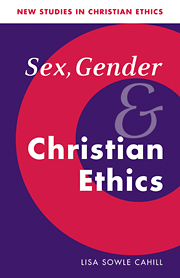Book contents
- Frontmatter
- Contents
- General editor's preface
- Acknowledgments
- 1 Sex, gender, and the problem of moral argument
- 2 Feminism and foundations
- 3 Particular experiences, shared goods
- 4 “The body” – in context
- An interlude and a proposal
- 5 Sex, gender, and early Christianity
- 6 Sex, marriage, and family in Christian tradition
- 7 The new birth technologies and public moral argument
- Concluding reflections
- Notes
- Index
- New Studies in Christian Ethics
6 - Sex, marriage, and family in Christian tradition
Published online by Cambridge University Press: 05 June 2012
- Frontmatter
- Contents
- General editor's preface
- Acknowledgments
- 1 Sex, gender, and the problem of moral argument
- 2 Feminism and foundations
- 3 Particular experiences, shared goods
- 4 “The body” – in context
- An interlude and a proposal
- 5 Sex, gender, and early Christianity
- 6 Sex, marriage, and family in Christian tradition
- 7 The new birth technologies and public moral argument
- Concluding reflections
- Notes
- Index
- New Studies in Christian Ethics
Summary
Faithfulness to NT criteria of moral discipleship should yield a sex and gender ethics which is also a social ethics, including and protecting society's judged, outcast, and vulnerable. Has Christian teaching and practice about sex, gender, marriage, and family enhanced appreciation of all persons' common humanity, the value of each, and the interdependence of all? Has it led to the construction of ecclesial and social institutions which give such appreciation stability and material expression? As on most other embodiments of discipleship, Christianity has on these issues a mixed record.
The pre-modern cultures which contributed to the first centuries of Christianity set a high priority on the social functions of marriage and family, and assumed gender to be both hierarchical and highly differentiated. According both to Roman law and to the traditions of the Germanic peoples who immigrated into Europe in the fourth century and later, sex was largely defined by its reproductive function, and parenthood and family by their socioeconomic functions. Sexual intimacy was structured patriarchally, and sexual pleasure was not linked to the mutual affection of the reproductive partners, so much as to the accomplishment of reproduction itself, whose requirements it always exceeded. Hence sex's reputation as unruly and dangerous to its own social role.
As we shall see, certain developments in the Christian theology and of marriage and in its regulation under ecclesiastical law worked to protect the dignity, freedom, equality, and affective relationship of spouses.
- Type
- Chapter
- Information
- Sex, Gender, and Christian Ethics , pp. 166 - 216Publisher: Cambridge University PressPrint publication year: 1996



